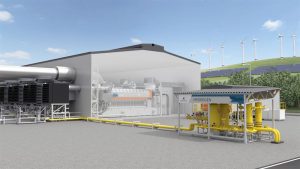The test campaign included both steady-state operation and 1,000 rapid power cycles. The system demonstrated high performance with electrical efficiency exceeding 85%, which translates to 39 kWh of electrical energy per kilogram of green hydrogen produced. In terms of electrolysis, this represents a 20–30% reduction in electricity usage compared to competing PEM and alkaline technologies.
The steam electrolyser is based on Elcogen’s solid oxide cell and stack technology implemented in Convion’s steam electrolyser system platform. Leveraging Convion’s experience in developing solid oxide fuel cell systems, this system was developed in record time.
The electrolyser was delivered and commissioned to a VTT test site in June 2023, where it was tested as part of a VTT-coordinated and Business Finland-funded E-Fuel project. The electrolyser delivered green hydrogen for a synthetic fuel demonstrator, where the final product was renewable diesel.
Kim Åström, the CTO of Convion, added: “We are extremely happy that the test campaign has demonstrated excellent operability, flexibility and resilience to the fluctuations in the steam supply, and validated superb efficiency as designed. These test results give us confidence that our platform approach for electrolysis is well suited for large, industrial-scale applications for electrolysis and bi-directional rSOC systems.”
Martin Rasmussen, the CTO of Elcogen, commented: “We are pleased that these excellent results are there as a result of our ultimate and efficient core technology being integrated inside Convion’s electrolysers. We are thrilled for the future and remain passionate in delivering our market leading products to be a leader in the transition away from fossil fuels.”
The project brought together a group of companies covering the entire value chain, from CO₂ sequestration to electricity and fuel production, logistics, as well as users of transport fuels in various transport segments, including Convion, Elcogen, Ineratec, VTT, CarbonReUse Finland, and Andritz.






